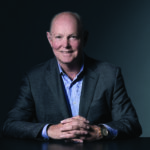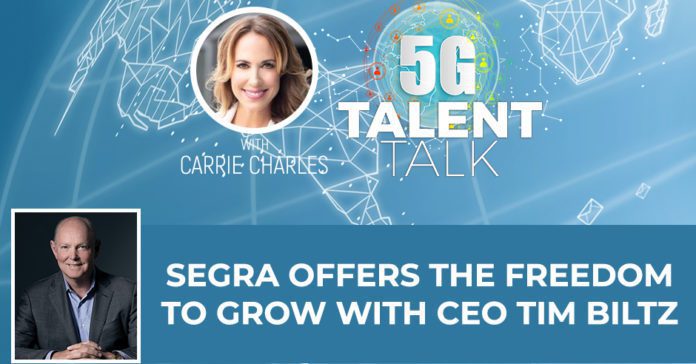Every company must have a proper workplace culture in order to succeed. But for it to be truly effective, it must not only focus on hitting the goals but also give employees a chance to grow. Carrie Charles is joined by Timothy Biltz, CEO of Segra, to share the secrets of doing an extraordinary workplace culture shift. He explains how starting with the core values made everything fall into place, giving their people a clear idea of how their work impacts the target market and even the entire industry. Tim also discusses the importance of empowering your employees by providing them with many opportunities to prove themselves, finding ways to keep engagement aflame, and allowing everyone to contribute even in the smallest ways possible to the entire company’s legacy.
—
Watch the episode here
Listen to the podcast here
Segra Offers the Freedom to Grow with CEO Tim Biltz
I am excited to have with me a special guest, the CEO of Segra, Tim Biltz. Tim, thank you for joining me.
Carrie, thank you for having me. I’m looking forward to our conversation.
Tim, you have been in the industry a long time. Tell me a bit about your journey, how you got, where you are now.
I’m no longer the youngster in the room, but I have had the good fortune of being in the wireless or the communications infrastructure industry my entire career. I started in the early to mid ‘80s, building cellular systems for a company called The Providence Journal, which we sold to GTE, which I guess became Singular and then AT&T. In ’89, I joined another relatively startup called Vanguard Cellular. Through the decade of the ‘90s operating under the Cellular One brand, we built the 2nd or 3rd largest independent setting of a business, primarily on the East Coast, about 35 markets, which sold to AT& T as well. The late ‘90s was the infancy of the tower industry and joined a sponsor and a great entrepreneur, Steve Clark, in the formation of SpectraSite.
From ‘99 to 2005, we built SpectraSite to just short of 8,000 towers, 10,000 rooftops, maybe 800 in-building systems before we merged with American Tower and created that global giant that still remains. After that, I took a few years off. I did some board work with some Sprint affiliates and stayed in the wireless industry. I did some private investing, I invested in a technology company called Yap. You know her now as Alexa. Amazon bought that technology and that company in 2011 and it was a voice recognition next generation. In 2012, I got called out of retirement to join a company called Lumos, which was based in Virginia. It was SILAC. When I say SILAC, buying from the local telephone company, marking it up, which was all in vogue in 2010, 2011 and 2012, but we rapidly turned it into a fiber company. We transformed the revenues to a facilities-based company versus off net business. In 2017, we sold to EQT, a major investor in our space, and created Segra by acquiring two other companies, Spirit Communications and NorthState.
The management team must always work for the employees.
Tell me more about Segra, your differentiators, your footprint, your business unit. There’s so much here that makes Segra special in the industry.
Segra at its core is a fiber company. We’re located in the Eastern part of the United States, think Pittsburgh to Atlanta, so the Carolinas and the Virginias, a bit into Maryland and Pennsylvania. We are a competitive fiber company. We run over 25,000 miles of fiber throughout that footprint. We consolidated three companies to create Segra, three well-performing but subscale companies. Company is now north of $550 million in revenues. We’re large enough to be relevant in the industry, but yet still have that small company entrepreneurial field that defines us as a challenger brand. Our product suites are what you would expect, dark fiber through lit services, primarily servicing large enterprises and wireless carriers. We do have a small residential business. It’s not so small anymore, maybe 100,000 homes, past 40,000 broadband customers of fiber, but just getting started.
I’ve heard you say that fiber is the heart of 5G. Talk a bit more about that and Segra’s role in the 5G ecosystem.
Being a wireless person that started with first-generation and watching the evolutions for each step and progressively getting more capabilities in the wireless network, even first going to digital and then going to 3G and 4G where we gave some robust improvements to the customers, 5G is a world of its own. It is as exciting of a time as the original self-building of cellular. It’s that type of step function. The speeds that it will provide, the capacity that 5G will provide, the ability to create new applications and allow the innovators of our next generation to exploit and provide better services. While all that’s exciting, and it is wireless, at the end of the day, fiber is the backbone. You need it for security, capacity and latency. It is the classic infrastructure play of 5G. I’m excited to partner with our carrier partners for them to deliver this amazing service. I’m a wireless guy at the heart. I’m excited about 5G.
I know that Segra is in a massive growth mode right now. I want to talk to you a bit about culture because there were some integrations that you went through. I know that you had to create a brand-new culture. How did you do that?
When Lumos was acquired, our first target or the company that we wanted to partner with or acquire was Spirit Communications. It was built as a merger vehicle. The companies were similar size, Lumos primarily in the Virginias and North, and Spirit in South Carolina and North Carolina. As a merger of equals, we had to start from scratch. Everything about culture starts with your core values and what defines you as a company and how you relate with your people. The first thing we did is we hired a talented but small, agile company to help us with this branding process group that we had worked with Nike at the beginning of Nike. We’re a challenger brand. The first thing we did is we brought about 50 people together across the company from frontline employees to senior executives.
We started with core values. We established our core values, many of them were similar between the two companies, but we created our own. We call them the Articles of Excellence. Once we had our core values established, we went to a brand promise, because a brand only reflects the culture of a company. We worked through our brand promise which is the freedom to grow. We allow our customers the ability to grow their businesses with freedom from the incumbents, the incumbent way of thinking, allow them to prepare their business for the future. Finally, we named the company that was a reflection of all of that, which is Segra. Segra was named by one of our employees. That was one of the recommendations. It made it through the whole process. It’s an ancient word. It means to win, to overcome, to prevail. That is reflective of this Team Segra.
Talk about employees having a voice. One of your employees named the company. You can’t get much better than that.
We went through all the whole legal process, but Segra kept coming up to the top and people rallied around it.
When you say challenge your brand, what do you mean by that?

In our definition, challenge is a status quo. All businesses have some form of communication and data networks. The question is, are those networks of such that allow them to grow and enable their business? Most companies are going through a digital transformation which is great for our industry. We go to them and challenge their way of doing business now, and primarily challenge our competitor’s way of doing business. We tried to shake the trees. We’ve probably grown little into double digit market share in our footprint now. We have plans to do more of that. You don’t go in thinking that they will buy from you because they need to or should. We earn their business, so it’s a challenge. We challenged the incumbents aggressively.
I also heard you say that culture is everything, and I know that you believe that in your heart. We know it’s important, but there are still companies out there that don’t have a strong culture. They don’t know how to create one. Why do you think it’s important? For companies that may be struggling with this, how do you recreate it and strengthen it?
If you heard about my journey, every one of those companies was a startup or early phase where we had a chance to develop our culture. In most cases, if you can go back far enough where cell phones were an annoyance the most and expensive, to come to a non-wireline telephone company, cellular business, you had to recruit hard, you had to sell a vision. You had to find people that that was attracted to it because it wasn’t a sure bet. Most people were working within the big telecoms. As a challenger brand, we offered both excitement for a great growth opportunity, we’ve got lots of demand, but also a place where you can contribute and most importantly, be heard and listened.
The workplace culture can’t be about a person. It has to be about a company.
Those basic respects for individuals, while they’re basic, the golden rule drives most of our culture. They get harder the larger you get. We’re focused as we scale the business not to lose. That’s been true for the early days of cellular, the early days of the tower industry, little startup of Yap, to even now Lumos and Segra. Energizing people and having them feel proud of the work that they do, but most importantly, by being respected and listened to. It doesn’t always mean we say yes, but having a voice is important. If people go on our website, they’ll see our articles of excellence, our core values and the descriptors. We also institutionalized ways as we get bigger to make sure we’re always in touch with our employees and the engagement. We can talk about that a bit, something called Peakon. It’s an employee engagement tool that we use, a couple of them.
Let’s talk about it now because I’m curious. Employee engagement is a challenge for everyone.

Early on, we either touch base by going out into the markets and talking to people and to have town halls and visit the markets. That was once every quarter, and then as you got bigger, maybe twice a year, and then as you got big, maybe once a year. As our footprint grew, we decided to ask employees every Monday morning, five questions, and they’re a rotating question. We’ve partnered with a third-party. It allows employees to communicate with us how they’re thinking, what they’re feeling. It takes a minute to fill out if you have nothing to say, and it could take an hour if that’s what you want. Every Monday morning it has been, for a number of years, a way to gauge how people are feeling and what they’re thinking. It allows us to see where we have hotspots or issues that come through the company. That’s a valuable management. I look at it as much as I do the financial statements.
How many employees do you have?
Any given day, 1,200.
Do you have every person complete this every Monday?
It’s their option. We have high participation rates, it’s 90%. It comes to their mobile. It’s five questions and they have the ability to give comments. Everything is 100% confidential. We don’t know who’s saying what. We do know where they roll up into the company and what department and what division. Each manager gets a statement of their employee engagement, some of the feedback that’s coming from their employees. We use it as a tool to make life better for them. Part of our culture is that the management team works for the employees. There’s no question about that. Without our employees, nothing else matters.
The other thing that you said, Tim, is you said, “I look at them.”
Every day I look at them. It’s just not me, it’s the entire management team. It’s part of the culture. We probably don’t push financials as low into the organization. Maybe I was accustomed to and years gone by when you had markets and regions, we’re still at the size that we do consolidate financials, but we do regional point engagement. That’s one thing every manager of people can look at every Monday. The other thing that we did that is equally as powerful is we created what we call the excellence in action. It’s an internal social network where employees get to recognize other employees for their actions and their contributions. They tie them back, those recognitions, to our core values, which is what we call it, excellence in action. As a company, each employee gets many points that they can redistribute in recognizing others. If I ever had a bad day, I go on excellence in action and read the amazing contributions our employees are making and being recognized by their peers. Those are the systematic things that drive culture because culture can’t be about a person. It has to be about a company.
You also have a knack for finding great talent. I know that you’ve hired some incredible people over your career. I’m curious if you would share a couple of secrets on how to find great talents.
It’s not charm and good looks for sure. I always say I’m amazed that everyone shows up to work, because it’s their choice. We start with that. It’s a relationship. When we’re recruiting, it’s a bit like courting. We were looking for somebody that has similar values, aspirations and not looking just for a job, although jobs are important, pay is important, income, because people have lives outside of work. We understand that. You’re trying to find that right mix which is what matters. It’s easier to recruit into great demand curve, you’re doing something meaningful. It’s easy to recruit into this industry now because we are creating a platform and infrastructure system along with our carrier partners that’s going to change the world.
Your legacy must be about leaving something better than you found it.
At the same time, there’s a lot of routine work that has to get done, whether that’s accounting or HR or billing, but it’s all part of something that’s special. We much use our industry to recruit because it’s a great industry. We also acknowledge people, like I did, I came in and got some experience, then took that experience and leveraged it other places in my career. We don’t want people to leave, but if it’s good for them, we were happy to have a lot of alumni out there. We always welcome people back if the grass wasn’t greener. It’s that appreciation that we try to meet people at where they are in their point in life and that’s allowed us to attract some great people. We have a great team.
What you said, Tim, which I love, is you said alumni, and it’s such a positive spin because when you’re an alumnus, you’re proud of where you came from and you got something special from that experience. I love that distinction.
One of my goals is that when people look back on their career, they’ll say, “I remember that time at Vanguard or SpectraSite or hopefully now Segra. That was the best years of my career.” I do have a lot of alumni out there. The tower industry is scattered with SpectraSite employees, and they’ve built great companies. Same for cellular, a lot of people that worked at Vanguard in those early days, they’re seeing the roles in industry now.
That brings me to another question, you said you wanted to build a legacy, and this seems like it’s part of that.
When I think about legacy, it goes back to the good book, which is you’re building something for the next generation. You leave something better than you found it and you build a foundation. I approach companies the same way. I could get hit by a bus tomorrow. Companies are not about people, they’re about what that company does. Legacy to me is having worked with the team to create something special that will have meaningful impact for the next generation of employees, broader society as a whole. Wireless is providing a great place to spend their career.
What are your hiring plans for 2021?
They’re still robust, maybe not as robust as we originally thought because of COVID. COVID is taking an impact. When we started in early 2020, we had rip roaring plans and we executed on them. We grew through COVID. We continued to invest in higher and we’re going to continue to invest in higher into 2021. If you go to the website, there are lots of openings. The positions you would most likely expect, network operations and customer care facilities, sales positions, but we also are recognizing that the country is not out of these woods yet. We’re investing heavily into the network with partnering with our wireless carriers as they deploy their 5G networks. We’re continuing to build a foundation, but we’re growing and plenty of openings. Come to the website.
Talk about the next several years for Segra. What’s on the horizon? What do you see?
My retirement. At the highest level, we want to double our market share. It’s significant now so we want to continue that challenger brand of bringing products and solutions to our enterprise and care of customers that would more than double our business on an organic basis. We have been inquisitive. We think scale is density and footprint, so we’ll continue to do tuck-in acquisitions. The company, if you think just doubling, brings us to well-over $1 billion in revenue before any major acquisitions. We’ll think about expanding the network footprint through bolt-on acquisitions across near our network. We are unique in the sense that we do not have networks scattered around the country.
I’m not pining on anyone else’s strategy, but we like a contiguous network and the ability to create a large community of interest to take advantage of fragmentation of our competitors. We’re not a global leader, but we are a super-regional leader. There are lots of demand for our products as our markets evolve to a fully digitized economy. That’s the ambition and I’ll be here for part of it, but I also I don’t want to put a ceiling on what this company can be. That will be the next generation of leaders to set those aspirations.
You came out of retirement once, you might do it again. Where can we reach Segra and find out about all the great jobs and about the company?

If you go to Segra.com, the top of the website will show you all about the company and its products and the services, but if you scroll to the bottom, you’ll see a button for careers. You hit that, you’ll see our core values pop straight up, what we stand for, and a little more definition about what they mean. There’s a button that says, “Look at career openings.”
Tim, this has been wonderful. Thank you for sharing your thoughts, talking more about Segra. I enjoyed getting a view into your culture and who you are as the CEO. It’s been a pleasure. Thank you.
It’s the same to you, Carrie. Thank you.
Important Links
About Tim Biltz
 Timothy G. Biltz currently serves as Chief Executive Officer of Segra, a role he assumed in April 2018 when Lumos Networks and Spirit Communications were brought under the same ownership group. In 2012, Mr. Biltz was named CEO and a director of Lumos Networks. Previously, Mr. Biltz served as director for NTELOS Holdings Corp. from 2006 to May 1, 2014.
Timothy G. Biltz currently serves as Chief Executive Officer of Segra, a role he assumed in April 2018 when Lumos Networks and Spirit Communications were brought under the same ownership group. In 2012, Mr. Biltz was named CEO and a director of Lumos Networks. Previously, Mr. Biltz served as director for NTELOS Holdings Corp. from 2006 to May 1, 2014.
He also served as a director for iPCS, Inc., a wireless service provider from 2004 to 2009 and served as Chairman of the iPCS Inc. Board starting in 2006. From 1999 to 2005, Mr. Biltz was the Chief Operating Officer of SpectraSite, Inc., a publicly-traded wireless and broadcast signal tower company. From 1989 to 1999 Mr. Biltz was employed by Vanguard Cellular Systems, Inc. in a number of posts of increasing responsibility ultimately serving as the Executive Vice President and Chief Operating Officer.
Love the show? Subscribe, rate, review, and share!
Join the 5G Talent Talk Community today:

